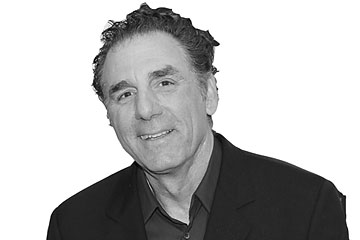
On your new show, Kirstie, you play the sidekick to an entertainer played by Kirstie Alley. How is that different from your role on Seinfeld?
Kramer didn't have a full-time job. So he was dangerous, because he was always making everything his job. Frank Baxter has been driving Kirstie's character, Madison Banks, for probably 20 years. He's based a bit on a person Kirstie knew who was her driver and like a brother to her.
Do you prefer that kind of comedy, with heart? One of the rules of Seinfeld was "No hugging, no learning."
I played Kramer like a dog: very devoted to Jerry. Frank's more of a rooster in a henhouse. He says, "I'll take care of this," and when he does, the situation blows up in his face. It's the old Laurel and Hardy "Let me do it!" then Oliver [Hardy] ends up stepping on a board with a nail and you see him trip and fall down a flight of stairs.
So at 64, do you still feel the urge to do physical comedy?
That's my deal. I can't resist. If I have an opportunity to bang into a door, I'll do it.
You haven't done much work since your outburst at a club in 2006. Are those two things connected?
I wasn't getting much work before the incident, which was one of the reasons I was ding-donging around in those clubs late at night, unannounced — coming in and working on material. I thought I would try to reinvent myself.
Comedians have to be very loose and unguarded. Are you afraid of it happening again?
What happened in the club? Oh, that'll never happen again. I know how to behave, to consciously behave. When something like that comes up, I don't let the heat of anger burn me up as it did. When you're under the helm of anger, watch out, 'cause it'll take you down. It's like being possessed by a demon.
What were you angry at?
Oh, angry at the act, angry that it wasn't funny, angry that I was being interrupted, angry that I'm not as good as I would like to be. You know, I was frustrated that night, and so I turned on everybody.
When you later apologized, you said you were going to do some personal work. What did that involve?
I wanted to see more about the man I am, and that meant being apart again from show business. I took a deep look at this and thought, Yes, we all make mistakes, but let's go further and see more about me. I moved away from Los Angeles. I took up photography, a lot of reading, a lot of writing. I traveled a bit. I got more in tune with my family. I began to take care of my mother, and still do, and that was helpful.
Do you feel you've been forgiven?
I don't know. I know I've forgiven myself. That's where it really starts for me.
What lured you back into TV? I'm assuming you still have crazy Seinfeld money.
Well, I'm an artist. You do it because you love to do it. It's what you are. It's the color of your fur. It's the same after all these years.
You've said you wish you'd enjoyed yourself more when you were making Seinfeld. What did you mean?
I think that's one of the reasons I took on Kirstie, because I wanted to do this more joyfully. When I was doing Seinfeld, I was very intense. Physical comedy takes more time to set up — rehearsing how to come through the door, that slide I did. So I was always in development, and that made me feel like I wasn't able to sit back and enjoy the ride. So this time, I want to be more like a child out on the street just playing and having fun and not taking it all so seriously.
